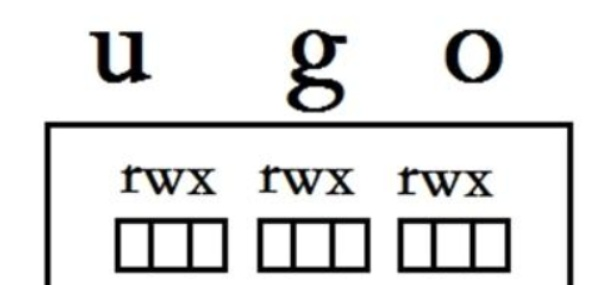我們linux伺服器上有嚴格的權限等級,如果權限過高導緻誤操作會增加伺服器的風險。是以對于了解linux系統中的各種權限及要給使用者,服務等配置設定合理的權限十分重要
1.基本權限 UGO
=====================================================
檔案權限設定: 可以賦于某個使用者或組 能夠以何種方式 通路某個檔案

權限對象:
屬主------->u
屬組------->g
其他人------>o
基本權限類型:
讀(read):r ---->4
寫(write):w ---->2
執行: x(exec) ----->1
chown:改變檔案或目錄的所屬主以及所屬組
chmod:為檔案或目錄設定通路權限
更改檔案的屬主(所有者)、屬組 (所屬組)
chown:
[[email protected] ~]# chown alice.hr file1.txt //修改屬主、屬組
[[email protected] ~]# chown tom file1.txt //修改屬主
[[email protected] ~]# chown .it file1.txt //隻改屬組
[[email protected] ~]# chown -R alice.hr dir1 //遞歸修改---針對目錄
更改權限
a. 使用符号[[email protected] ~]# chmod u+x file1.txt //屬主增加執行
[[email protected] ~]# chmod a=rwx file1.txt //所有人等于讀寫執行
[[email protected] ~]# chmod a=- file1.txt //所有人都沒有權限
[[email protected] ~]# chmod ug=rw,o=r file1.txt //屬主屬組等于讀寫,其他人隻讀
[[email protected] ~]# ll
-rw-rw-r--. 1 tom it 0 Nov 1 15:30 file1.txt
[[email protected] ~]# chmod 644 file1.txt
[[email protected] ~]# ll file1.txt
-rw-r--r--. 1 tom it 0 Nov 1 15:30 file1.txt
[[email protected] ~]# chmod 755 file1.txt
[[email protected] ~]# ll
-rwxr-xr-x 1 root root 0 Jul 23 22:40 file1.txt
[[email protected] ~]# chmod 521 file1.txt
[[email protected] ~]# ll
-r-x-w---x 1 root root 0 Jul 23 22:40 file1.txt
權限掩碼
umask 使用者掩碼控制使用者建立檔案和目錄的預設權限
root使用者預設權限
目錄777 檔案666
檢視umask
[[email protected] ~]#umask
0022 root賬戶預設
0002 普通使用者預設
修改umask
[[email protected] ~]#umask 0111
通過計算得出root使用者建立目錄和檔案的權限為
對檔案:
r----cat
w ---vi、vim
x ---- bash /dir/file
對目錄:
r ---ls
w -----touch、rm
x ---- cd
2.2.rwx對檔案的影響實戰案例1:rwx對檔案的影響
[[email protected] ~]# vim /home/file1
date
[[email protected] ~]# ll /home/file1
-rw-r--r--. 1 root root 5 Nov 3 15:19 /home/file1
[[email protected] ~]# su - alice #切換普通使用者
[[email protected] ~]$ cat /home/file1
date
[[email protected] ~]$ /home/file1 #執行檔案
-bash: /home/file1: Permission denied
[[email protected] ~]$ exit
logout
[[email protected] ~]# chmod o+x /home/file1
[[email protected] ~]$ /home/file1
Sun Nov 3 15:26:21 CST 2019
[[email protected] ~]# chmod o+w /home/file1
[[email protected] ~]$ vim /home/file1
date
123
ls
實戰案例2:對目錄沒有w,對檔案有rwx
[[email protected] ~]# mkdir /dir10
[[email protected] ~]# touch /dir10/file1
[[email protected] ~]# chmod 777 /dir10/file1
[[email protected] ~]# ll -d /dir10/
drwxr-xr-x. 2 root root 19 Nov 3 15:37 /dir10/
[[email protected] ~]# ll /dir10/file1
-rwxrwxrwx. 1 root root 0 Nov 3 15:37 /dir10/file1
[[email protected] ~]# vim /dir10/file1
jack
[[email protected] ~]# su - alice
Last login: Sun Nov 3 15:28:06 CST 2019 on pts/0
[[email protected] ~]$ cat /dir10/file1
jack
[[email protected] ~]$ rm -rf /dir10/file1 #權限不夠
rm: cannot remove ‘/dir10/file1’: Permission denied
[[email protected] ~]$ touch /dir10/file2 #權限不夠
touch: cannot touch ‘/dir10/file2’: Permission denied
實戰案例3:對目錄有w,對檔案沒有任何權限
[[email protected] ~]# chmod 777 /dir10/
[[email protected] ~]# chmod 000 /dir10/file1
[[email protected] ~]# ll -d /dir10/
drwxrwxrwx. 2 root root 19 Nov 3 15:38 /dir10/
[[email protected] ~]# ll /dir10/file1
----------. 1 root root 5 Nov 3 15:38 /dir10/file1
[[email protected] ~]# su - alice #切換普通使用者
Last login: Sun Nov 3 15:38:53 CST 2019 on pts/0
[[email protected] ~]$ cat /dir10/file1
cat: /dir10/file1: Permission denied #沒有權限
[[email protected] ~]$ rm -rf /dir10/file1
[[email protected] ~]$ touch /dir10/file2
小結
對目錄有w權限,可以在目錄中建立新檔案,可以删除目錄中的檔案(跟檔案權限無關)
注意事項
檔案: x 權限小心給予
目錄: w 權限小心給予
進階權限
進階權限 suid,sgid,sticky
問題1: 為什麼會失敗!
[[email protected] ~]# chown root.root /root/file1.txt
[[email protected] ~]# vim /root/file1.txt
123
[[email protected] ~]# ll /root/file1.txt
-rw-r--r--. 1 root root 0 Nov 1 15:30 /root/file1.txt
[[email protected] ~]# su - alice
Last login: Sun Nov 3 15:57:41 CST 2019 on pts/0
[[email protected] ~]$ cat /root/file1.txt
cat: /root/file1.txt: Permission denied
suid ==== 4 提權 (隻對二進制指令檔案生效,其他不管用)
sgid ==== 2 組權限繼承 (隻能對目錄設定)
sticky == 1 (t權限) 權限控制
a、字元---文法:
chmod u+s file
chmod g+s dir
chmod o+t dir
b、數字
chmod 4777 file
chmod 2770 dir
chmod 1770 dir
suid 普通使用者通過suid提權 <針對檔案>
在程序檔案(二進制,可執行的指令檔案)上增加suid權限
[[email protected] ~]# chmod u+s /usr/bin/cat
[[email protected] ~]# chmod u+s /usr/bin/rm
[[email protected] ~]# su - alice
Last login: Wed Nov 6 17:40:40 CST 2019 on pts/0
[[email protected] ~]$ cat /root/file1.txt
123
[[email protected] ~]$ rm -rf /root/file1.txt
那麼這個特殊權限的特殊性的作用是什麼呢?
1、SUID權限僅對指令檔案(二進制檔案)有效;
2、執行者将具有該程式擁有者(owner)的權限。
[[email protected] ~]# ll /usr/bin/rm
-rwsr-xr-x. 1 root root 62864 Nov 6 2016 /usr/bin/rm
此時一旦給rm加上suid權限之後,普通使用者相當于root使用者。(即提權)
[[email protected] ~]# chmod u-s /usr/bin/rm #取消提權
首先建立一個使用者組,兩個使用者進行這三個案例操作
Set GID把s放到檔案的所屬使用者組的x位置上的話,就是SGID。那麼SGID的功能是什麼呢?和SUID一樣,隻是SGID是獲得該程式所屬使用者組的權限。
SGID主要用在目錄上-----如果使用者在此目錄下具有w權限的話,使用者在此目錄下建立新檔案,則建立的這個檔案的群組與此目錄的群組相同。
案例
[[email protected] ~]# mkdir /opt/dir1 #建立目錄
[[email protected] ~]# groupadd hr #建立一個組
[[email protected] ~]# chmod 775 /opt/dir1/ #設定權限
[[email protected] ~]# ll -d /opt/dir1/
drwxrwxr-x. 2 root root 6 Nov 6 21:26 /opt/dir1/
[[email protected] ~]# chown .hr /opt/dir1/ #設定屬組
[[email protected] ~]# chmod g+s /opt/dir1/ #設定sgid
[[email protected] ~]# ll -d /opt/dir1/
drwxrwsr-x. 2 root hr 6 Nov 6 21:26 /opt/dir1/
[[email protected] ~]# touch /opt/dir1/a.txt
[[email protected] ~]# ll /opt/dir1/a.txt
-rw-r--r--. 1 root hr 0 Nov 6 21:33 /opt/dir1/a.txt
[[email protected] ~]# chmod o+w /opt/dir1/ -R
[[email protected] ~]# su - alice
Last login: Wed Nov 6 21:34:59 CST 2019 on pts/2
[[email protected] ~]$ touch /opt/dir1/b.txt
[[email protected] ~]$ ll /opt/dir1/b.txt
-rw-rw-r--. 1 alice hr 0 Nov 6 21:35 /opt/dir1/b.txt
這個就是針對others來設定的了,和上面兩個一樣,隻是功能不同而已。
SBIT(Sticky Bit)目前隻針對目錄有效,對于目錄的作用是:當使用者在該目錄下建立檔案或目錄時,僅有自己與 root才有權力删除。
案例
[[email protected] ~]# cd /home/
[[email protected] home]# mkdir dir2
[[email protected] home]# chmod 757 dir2/
[[email protected] home]# chmod o+t dir2/
[[email protected] home]# ll -d dir2/
drwxr-xrwt. 2 root root 52 Oct 31 16:49 dir2/
[[email protected] home]# useradd jack #建立使用者
[[email protected] home]# su - alice
Last login: Wed Nov 6 21:48:12 CST 2019 on pts/2
[[email protected] ~]$ touch /home/dir2/alice.txt #使用者alice建立檔案
[[email protected] ~]$ exit
logout
[[email protected] home]# su - jack
Last login: Wed Nov 6 21:48:36 CST 2019 on pts/2
[[email protected] ~]$ touch /home/dir2/jack.txt #使用者jack建立檔案
[[email protected] ~]$ rm -rf /home/dir2/alice.txt
rm: cannot remove ‘/home/dir2/alice.txt’: Operation not permitted
測試jack删除alice建立的檔案,無法删除
sudo: 有針對性,例如針對某個使用者以能夠以root的身份執行某些指令。
suid: 基本針對所有使用者,任何使用者在執行有suid權限的程式時(例如/usr/bin/rm),都是以root身份在執行。